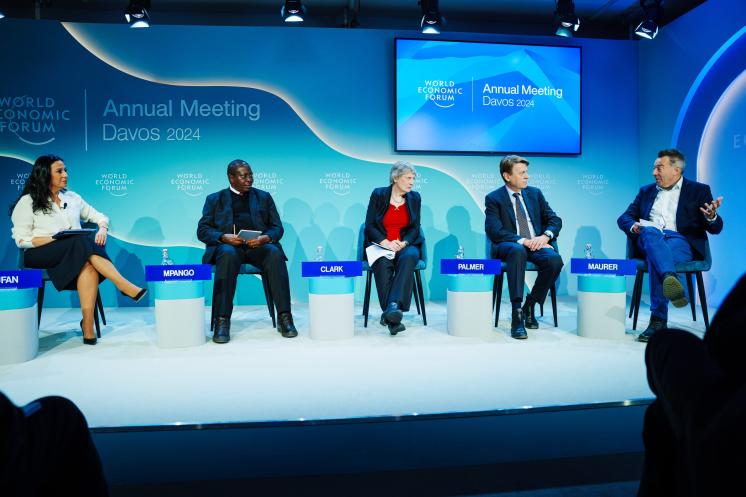
EITI Chair Helen Clark at Davos: Inclusive governance is needed in the energy transition
Helen Clark reflects on climate change, shifting demand for resources and the role of transparency and governance to achieve a just transition.
This article is adapted from remarks delivered by Rt Hon. Helen Clark at the 2024 World Economic Forum session "Being honest about governance".
The prospect of increased minerals demand has propelled resource governance onto the political agenda of countries who rely on metals such as cobalt, lithium and copper as a future source of revenues. In dialogue with leaders at the recent World Economic Forum, I was asked to comment on the most pressing risks facing the world today and on how weak governance could derail our efforts to meet this challenge.
Risks associated with climate change will impact all of us living today as well as future generations, affecting our physical environment, livelihoods, health and wellbeing. Minerals are a critical building block in the energy transition and governance risks in the mineral value chains of low-carbon technologies are a significant area of concern. According to the International Energy Agency, a typical electric car requires six times the mineral inputs of a conventional car, and an offshore wind farm requires thirteen times more minerals than a gas-fired plant of similar size.
Minerals demand is expected to boom in the coming decades on the back of this demand. This is borne out by research by the EITI and the Sustainable Minerals Institute in Australia, which showed that demand for minerals such as lithium from the energy sector could grow by as much as 900 percent by 2040.
Governance risks in the mineral value chains of low-carbon technologies are a significant area of concern.
Prices for many minerals are already experiencing volatility as a result of these trends. We saw sharp price increases in 2021 and in the first half of 2022. According to data from the International Energy Agency and the London Metals Exchange, the price of copper rose two and a half-fold in the two years to May 2022. While prices have moderated since then, these market dynamics are undoubtedly driving the search for new mineral deposits.
Governance risks in the minerals sector
A mining boom presents a multitude of risks – from environmental harm and social conflicts to corrupt deals and mismanaged public finances. And weak governance exacerbates these risks. It undermines public trust, increases the cost of doing business and has the potential to disrupt the supply of minerals needed for the energy transition.
Similar dynamics are playing out in the renewable energy sector. The International Energy Agency estimates that we need USD 5 trillion in annual renewables investments globally by 2030 in order to meet net-zero goals. At COP28, more than 120 countries pledged to triple renewable energy capacity by 2030.
The speed and scale of this change makes the renewable energy sector prone to governance risks, as the EITI has shown through recent research. As in the mining sector, this is eroding trust, disrupting projects and creating an obstacle to the sector’s growth.
A global standard for inclusive governance
The EITI is evolving to keep up with these shifts. Transparency is essential to ensure that the mistakes of the past are not repeated and that corruption and poor governance do not erode the benefits of natural resources which belong to citizens. The energy transition must be enabled to deliver peace and prosperity and not conflict and division.
Solutions lie in reinforcing transparency and in setting and adhering to international norms promoting greater accountability. In both mining and renewable energy, good governance can result in better environmental, social, and human rights standards. It can reduce corruption and build trust in the energy transition.
Solutions lie in reinforcing transparency and in setting and adhering to international norms promoting greater accountability.
EITI data and dialogue are proving increasingly relevant to policymakers in this era of energy transition. The extractive sector is experiencing fundamental changes, to which producer and consumer countries alike must adapt.
The role of multi-stakeholder dialogue
At a global level, the EITI’s supporters include many of the world’s largest mining and energy companies, including six of the top ten mining companies by market capitalisation and four of the top ten oil and gas companies. The EITI’s global supporters also include many of the most influential civil society organisations active in the sector. They are seized both by the opportunities and the challenges posed by the energy transition to ensure long term sustainability.
At the national level, the EITI has been working to strengthen institutions of governance to close avenues for corruption in the extractive sector. For example, in Tanzania, a producer of transition minerals such as graphite, nickel and rare earths, the EITI contributed to the development of regulations providing for the disclosure of contracts and beneficial ownership data.

At the local level, the EITI has explored how the energy transition impacts on communities. Across diverse communities in Colombia, Ghana, and Indonesia, the EITI found that it is not sufficient for governments and companies only to commit to transparency. Communities need information which is easy to access, understand, and use. They must also be meaningfully involved in decisions impact their lives.
Multi-stakeholder collaboration is critical if we are to meet the most pressing challenges of our time.
Multi-stakeholder collaboration is critical if we are to meet the most pressing challenges of our time. That is why EITI has been working with partners internationally to tackle a range of governance risks in the energy transition – including by convening a network of producer countries and by rallying leading actors in the renewable energy sector around a call to action for transparency and accountability. Without a united front and resolute commitment to an inclusive transition, we risk jeopardising the very foundation of our journey towards a sustainable future.



